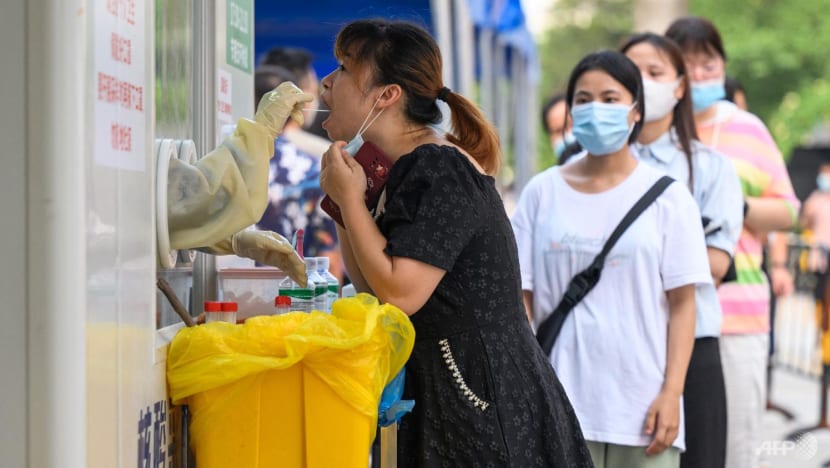Snap Insight: China finally acknowledges difficulties of zero-COVID for its people
The socioeconomic costs and psychological trauma of China’s zero-COVID measures have become unbearable, finally making Beijing loosen restrictions, says East Asian Institute’s Chen Gang.

People waiting in line for a COVID-19 test in Guangzhou, China. (Photo: AFP)
SINGAPORE: Public grievances over China’s zero-COVID policy, which ignited unprecedented mass protests in more than a dozen cities, finally made the government loosen its restrictions that lasted for almost three years.
While the rest of the world has largely learnt to live with the virus, China, where the first COVID-19 case was reported, has just started to ponder this option.
China’s National Health Commission on Wednesday (Dec 7) announced the frequency and scope of PCR testing will be reduced, while lockdowns will be limited as much as possible.
The central government is requiring local authorities to free areas that show no positive cases after five days, and to allow people with non-severe COVID-19 infections to isolate at home instead of appointed facilities.
People will no longer be required to show a green health code on their phone to enter most public buildings and spaces, and China will accelerate the vaccination of the elderly, long seen as a major obstacle to relaxing COVID-19 rules.
GRADUAL EXIT FROM ZERO-COVID
These new measures can be regarded as signs of China’s gradual exit from its zero-tolerance stance. China’s early success in curbing the spread of coronavirus won praise from home and abroad, but increasingly, the socioeconomic costs and psychological trauma of zero-COVID measures have become unbearable.
Public anger at lockdown measures had grown throughout the year before reaching boiling point. On social media, people expressed frustration over access to medical care and complained about difficulties purchasing food as delivery services were overloaded.
The recent protests were the first nationwide demonstration in decades, spanning university students, small business owners and ordinary Chinese citizens. It sent a warning signal to the government that the restrictions were economically and socially unsustainable and could lead to political backlash if people’s demands were not addressed properly.
After mass protests against COVID-19 restrictions in Belgium, the Netherlands and the United States, Chinese authorities should have been aware of the risks associated with stringent quarantine and lockdown measures.
UNREALISTIC TO ELIMINATE COVID-19 ENTIRELY
Meanwhile it has proven unrealistic to eliminate COVID-19 entirely, given Omicron’s high transmissibility and the large number of asymptomatic cases. The reality was that many provinces could not keep the number of cases at zero as they had done from 2020 to 2021.
The world’s second biggest economy had been shooting itself in the foot by imposing endless lockdowns that prolonged supply-chain bottlenecks, worsened unemployment and weakened domestic consumption.
During the Chinese Communist Party’s 20th Party Congress in October, Chinese leader Xi Jinping spoke highly of the zero-COVID policy, which followed the principle of the “supremacy of the people and the supremacy of life”. But he did not elaborate on the prospect of zero-COVID, leaving open the possibility of policy adjustment down the road.
The conclusion of the Party Congress boosted the confidence of the leadership in cross-border travel. Xi and his colleagues started travelling overseas more often to seek international influence, while lower-level visits to other countries resumed gradually.
The recent relaxation indicates that policymakers now have a better understanding of the difficulties of the masses in the zero-COVID situation, and are ready to change the course of pandemic policy.
Dr Chen Gang is a senior research fellow and assistant director of the East Asian Institute, National University of Singapore.


















